Map the System: Youth Suicide Crisis in India
On 15-17 June 2020, the Skoll Centre’s Map the System Competition held its Global Final virtually. The team from Amani Institute competed against 30 other finalists from institutions around the world. Team members Bhairavi Prakash, Maya Narayan, Anshul Agrawal, Neeraja Kulkarni and Tushara Ravindranath tell us how they mapped the system for addressing youth suicide crisis in India.
In February this year, when India had still not experienced the gravity of the COVID19 pandemic, five of us got together and decided to participate in the Map the System 2020 challenge. Although we come from diverse backgrounds, Bhairavi (Psychology), Anshul and Maya (Systems Thinking), Neeraja (Design Thinking) and Tushara (Academic Research), the common thread which connects us together is that we are all young professionals who have spent at least two decades of our lives, being a part of the Indian education system, and have been witness to some of the challenges it exposes students to. The situation has only gotten from bad to worse in the past decade, where roughly one Indian student dies by suicide every hour. Given the alarming rate of deaths by suicide among Indian youth, we chose to explore the various factors that contribute to this crisis.
Secondary Research
We undertook extensive literature review and realised that death by suicide is a complex biopsychosocial phenomenon, requiring a multi-sectoral approach for tackling. We particularly looked at Higher Education Institutions (HEIs) as spaces, where psychosocial determinants play out in myriad ways.
Primary Research
We created an online survey (436 student participants) across different HEIs in India to understand this issue. The survey had questions on factors that impacted student wellbeing, and on coping mechanisms that they used to deal with emotional distress. In addition to the survey, we also conducted 10 in-depth interviews of experts working in the fields of education, mental health policy and practice, funding ecosystem, etc.
Following were the findings from our research:
- Complex bio-psycho-social factors can contribute to emotional distress, which can lead to death by suicide.
- Young people are open about their struggles with mental health, however, usage of services is low.
- Deaths by suicide are found across the spectrum of HEIs in India, not just engineering and medical institutions.
- There are barriers to both seeking and providing help, which widens the treatment gap among young people.
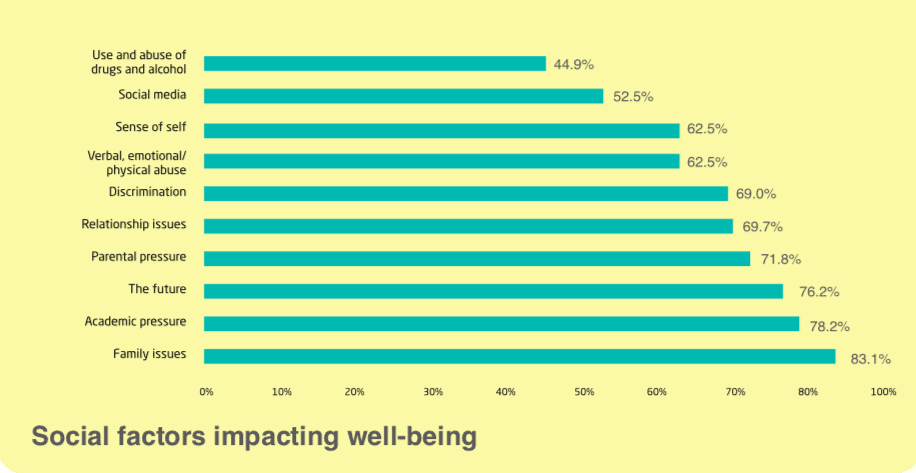
Problem Landscape
We used system mapping tools to further analyse the data collected. We identified four major systems that interact to have an impact on one’s mental wellbeing. Interconnections between these systems, further exacerbate the challenges faced by youth, affecting their mental wellbeing.
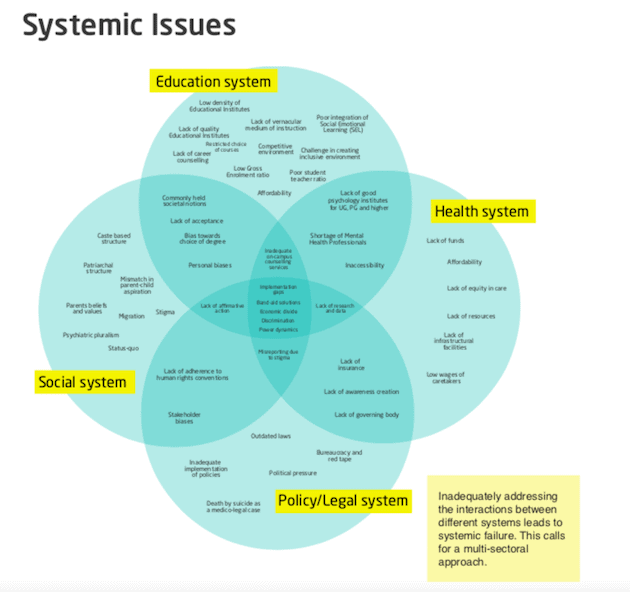
We also classified the existing solutions in three categories: Knowledge and Awareness, Services and Skills.
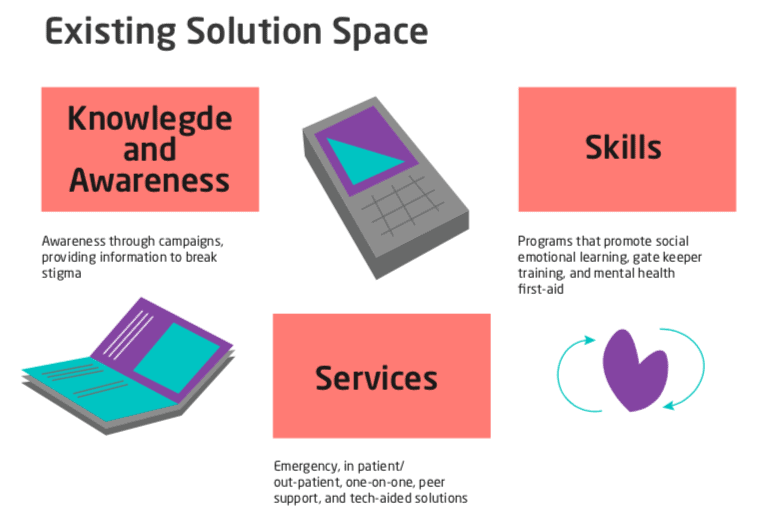
Shifting the Burden Archetype
Analysing the current solutions landscape, we found an overwhelming focus on short-term remedial solutions that are easier to formulate and less expensive. This consequently, acts as a barrier to implementing restorative solutions that address the root causes and could have a long-term impact on reducing emotional distress.
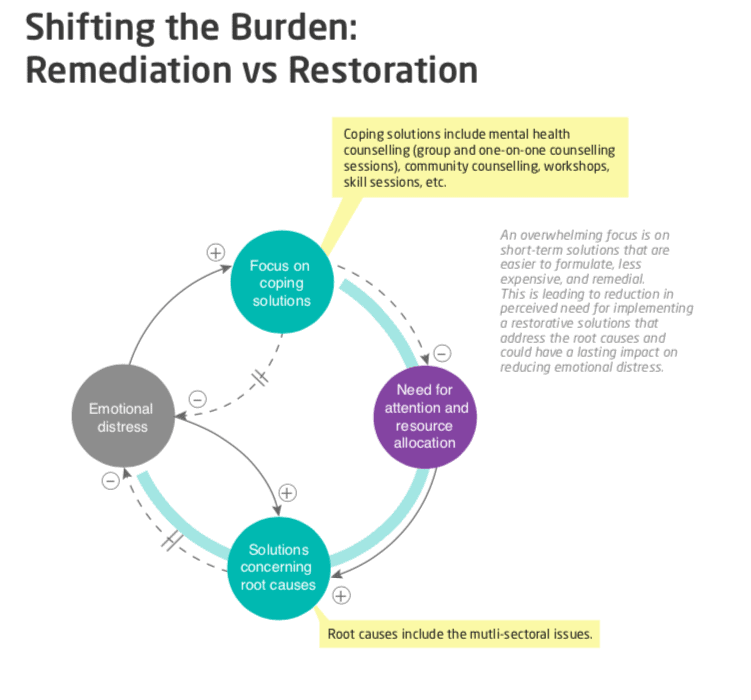
Gaps & Levers
We observed multiple political, social, cultural, and economic factors, possibly acting as tipping points that contribute to suicidal ideation amongst young people. Based on these factors, we identified four overarching gaps in the system and 22 levers for systemic change.
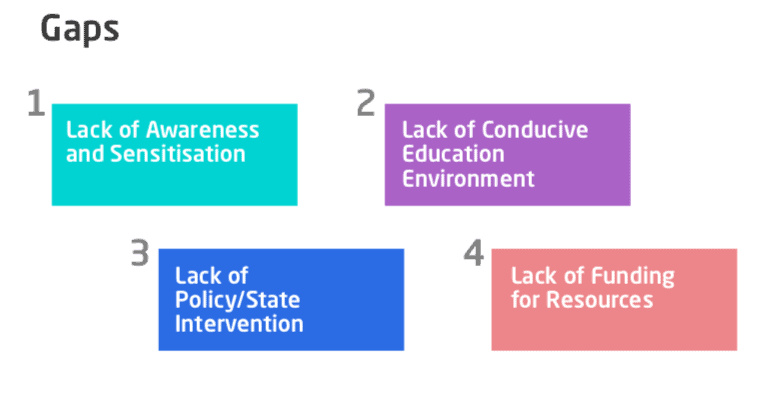
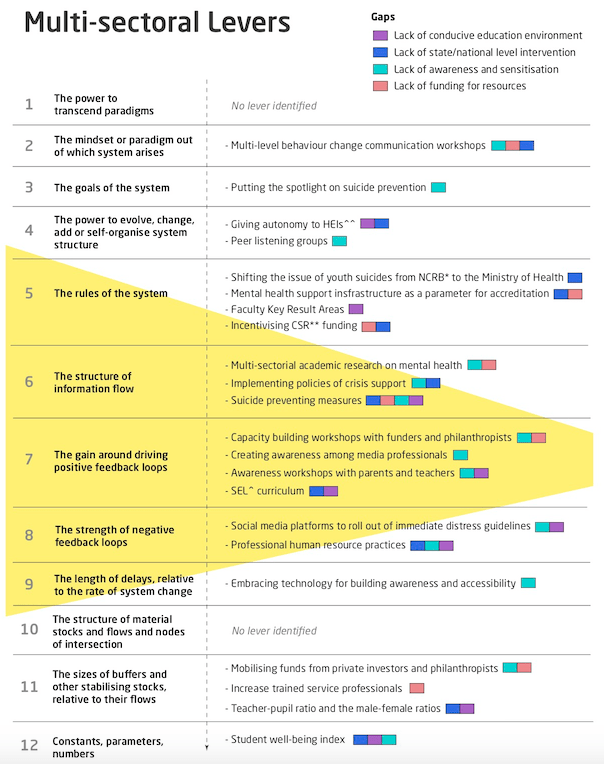
Key Learnings from Systems Mapping
- Deaths by suicide are symptomatic of larger structural and systemic challenges and completely preventable.
- Preventive interventions for youth suicide need to be prioritised in schools, colleges, families, communities, and society at large.
- Contextualisation and scalability are important factors for proper understanding of the problem space, and require adequate human and financial capital.
- Visualisation of the system by diverse stakeholders can help build a comprehensive narrative that is key to determine the success of interventions.
Way Forward
Being one among the top 31 global finalists at Map the System 2020, was a wonderful opportunity to connect with systems thinkers across the globe, and learn about the complex problems they are working upon.
To further our study and alleviate this challenge, we have applied for a Think Tank Grant. Our goal is to organise an immersive conference and introduce contemplative practices (traditional forms including yoga and meditation, and expressive forms including art, theatre, and movement therapy) for building resilience and emotional regulation in young people.
As appeared on the Skoll Centre Blog.